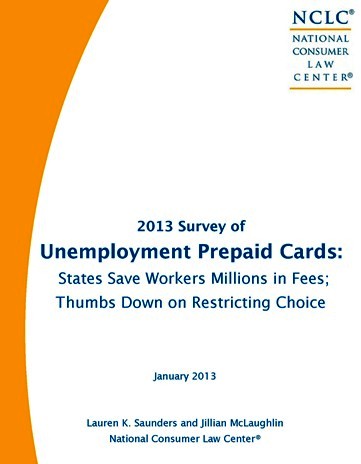NCLC’s survey of 42 states’ unemployment compensation prepaid cards reveals that fees are down, but some states still refuse to offer or inhibit the choice of direct deposit. Giving recipients the choice of direct deposit to their own account before enrolling them in the prepaid card allows recipients to choose the fastest, most convenient, least costly method to receive benefits. Importantly, it is also the law.
Full Report (PDF)
Executive Summary (PDF)
Direct Deposit Enrollment by State (PDF)
National Overview of Usage and Fees (PDF)
State-by-State Highlights Chart, Notable Fees, & Bank Issuer (PDF)
2013 Press release (PDF)
2011 UC Prepaid Card Full Report (PDF)
2017 Update (PDF)
Media Highlight:
![]() “The price of unemployment debit cards” by Kristin Arnold (video interview with Lauren Saunders)
“The price of unemployment debit cards” by Kristin Arnold (video interview with Lauren Saunders)
Related Publications for Attorneys: Consumer Banking and Payments Law
Most workers choose direct deposit to their own account when the choice is made easily available.
- Minnesota has the highest direct deposit rate of 82%, and Arizona’s is the lowest at 16%, with a median rate of 57%.
- Five states (California, Indiana, Kansas, Maryland and Nevada) violate federal law and require workers to receive benefits on the state vendor’s prepaid card.
Many states have lowered fees on their UC prepaid cards.
- Overdraft fees have been eliminated, point-of-service fees are nearly gone and ATM fees are easier to avoid.
- In Pennsylvania, the state projects that workers will save $5.2 million through several improvements to the card program.
- NCLC now rates 18 cards as “thumbs up” and only 3 as “thumbs down” (out of 42 cards). In 2011, 8 cards out of 40 merited a positive rating and 16 were negative.
Recommendations
- Prominently offer direct deposit to the worker’s own account first, at time of application, and make sign-up easy.
- Offer a minimum of one free ATM and teller withdrawal for each deposit and preferably more.
- Eliminate fees for balance inquiries, customer service and denied transactions.
- Monitor fees and involve workers and advocates to address excessive costs.
- Publicize methods of fee-free cash access and card use.
- Offer prominent, complete and accurate fee information on the state website.
As of January, 2013:
![]() Best cards
Best cards
California and New Jersey (Bank of America)
Pennsylvania (JPMorgan Chase)
![]() Runners up cards
Runners up cards
Arizona, Rhode Island (JPMorgan Chase)
Arkansas, Idaho, Minnesota, Nebraska, North Dakota, Ohio, Oregon, South Dakota, and Wyoming (U.S. Bank)
District of Columbia, Maryland (Citibank)
Georgia (Comerica)
South Carolina (Bank of America)
![]() Problematic Cards
Problematic Cards
Alaska (JPMorgan Chase)
Indiana (PNC)
Iowa (Wells Fargo)

